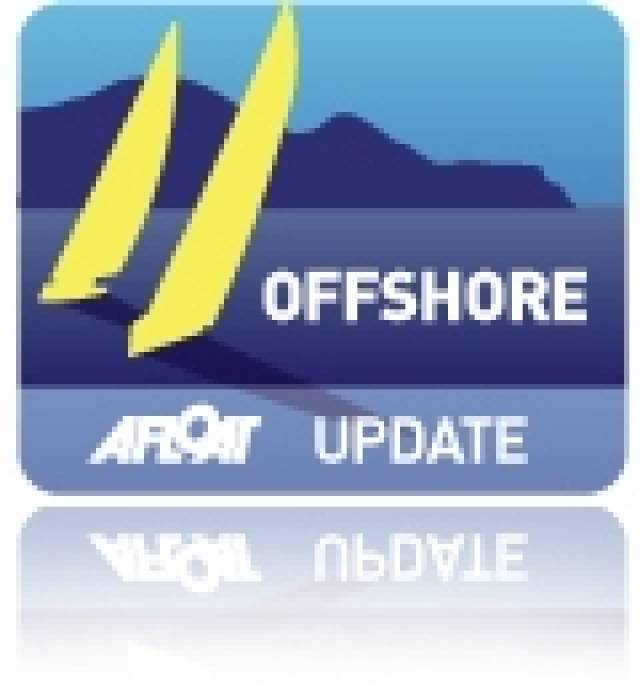#roundirelandrecord – At his fourth attempt, top French skipper Sidney Gavignet with the Mod 70 trimaran Musandam-Oman Sail has finally toppled the long-standing Round Ireland record set in September 1993 by American Steve Fossett with the 60ft trimaran Lakota, but by only three hours.
And if anything, the Gavignet achievement has heightened just what a remarkable job was done 22 years ago when the American skipper with his smaller, heavier and much less technically advanced boat set such an exceptional time writes W M Nixon.
Unlike the state-sponsored Musandam-Oman campaign (and it's one very rich state), the Lakota project was very much a private enterprise effort, with Fossett's crew including husband-and-wife multi-hull enthusiasts Con Murphy and Cathy MacAleavey of the National YC in Dun Laoghaire. They had met the Lakota crew in Portugal some months earlier, and had persuaded them that a successful round Ireland challenge was just what was needed to set Fossett's sailing on the track to high achievement, and their suggestion succeeded brilliantly on both counts.
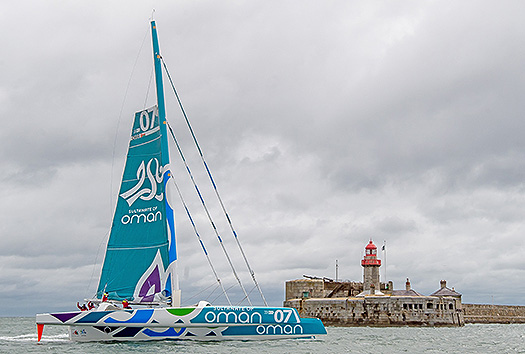
The new record holders – The mighty Mod70 returns to Dun Laoghaire this morning
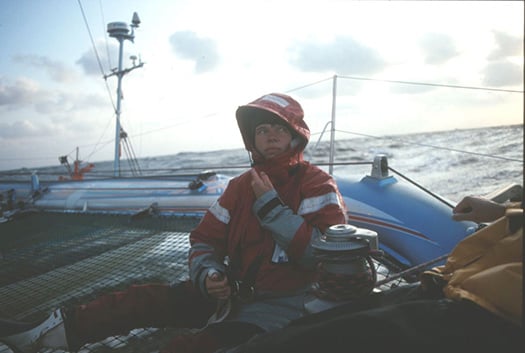
Cathy MacAleavey in some of the gentler conditions during Lakota's successful challenge
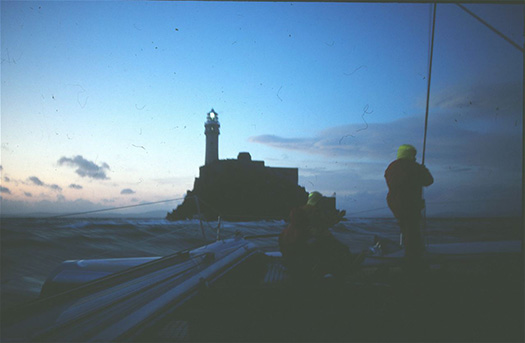
Getting there – when Lakota went past the Fastnet during her 1993 anti-clockwise circuit, they knew they were well on their way with the chance of an outstanding record.
Lakota's startling new time of 44 hours was not easily achieved, as the boat had arrived in Dun Laoghaire with a damaged mainsail which had to be rushed to Crosshaven for repairs by McWilliam Sailmakers while the clock was remorselessly ticking down towards the ideal situation of a vigorous low pressure area becoming centred over Ireland.
But as it happened, the Gods were on their side. The delay while waiting for the sail repair made the weather situation even better as far as records were concerned, and Lakota went round in style as regards speed, though for quite a lot of the passage she was sailing in conditions in which most people would have been very content to stay comfortably at home in front of a large fire.
And as the Lakota challenge included Irish crew and was Irish inspired, we all felt that we had a part of it, however small. But for this new record, the only Irish element has been the weather and our coastline, for although Gavignet's interest was first inspired some years ago by our own Damian Foxall who was involved in two of Gavignet's previous attempts on the Ireland challenge, the Kerryman is of course currently active in the Volvo World Race, and has had the frustration of watching from afar as Gavignet finally does the business.
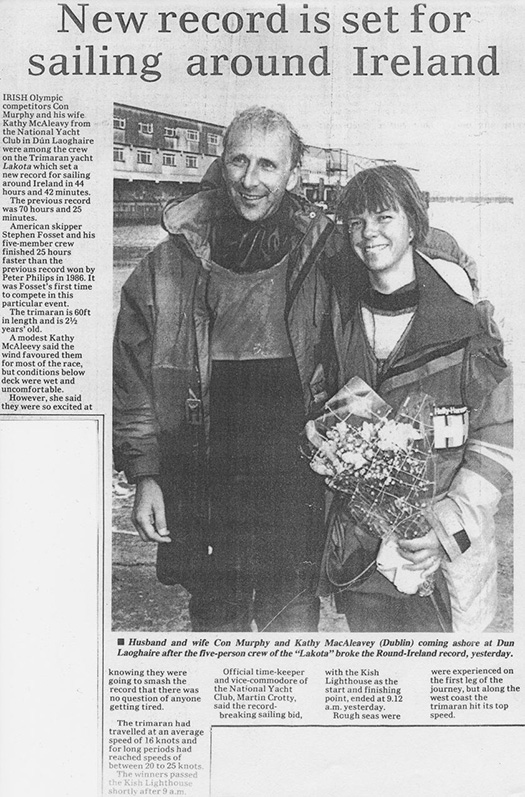
Tired but triumphant – Con and Cathy as pictured in the Evening Herald at the conclusion of Lakota's successful challenge
As it happens, although the monitoring of the challenge has been under Record Commissioner Chris Moore of the National Yacht Club, the crew is distinctly international, with two French – Gavignet himself and veteran Jean Baptiste Leavailliant, plus one Spanish, Alex Pella, and three Omanis who are now Gavignet veterans - Fahad Al Hasni, Yasser Al Rahbi, and Sami Al Shukaili.
The weather pattern was settling in nicely with strong sou'easters when they went off at 1800 hrs on Monday to storm northeastwards from the start point at the Kish L/H through the Irish Sea. But the current spell of volatile weather was making things decidedly moody over the north of Ireland. What had been a useful low pressure area of around 780 had already developed further to have two centres, and it may well have become the case that at least three different vortices were in action to provide unstable wind patterns of rapidly varying strengths, and sometimes no strength at all.
For the first stage, they'd been averaging speeds of up to 25 knots and better, and had confidently been anticipating knocking a cool ten hours off the record. That would have brought it in within the 35 hour working week so beloved of the French. But the fickle North Channel winds had other plans, and they unexpectedly dropped to just 6.32 knots SOG off Cushendall in County Antrim for a frustrating period around midnight on Monday.
Then they got going again along the North Coast, and were well back on track for a new record which, after all, required an average speed of only 16 knots. But one of the low pressure centres off the Donegal coast got itself all over the place through Tuesday afternoon, and progress was at times excruciatingly slow – at one stage northwest of Erris Head in far Mayo, they were crawling along at 3.11 knots, which for a MOD 70 is dead stopped.
The frustration was enormous, for they knew there were strong west to northwest winds on the way, and trying to get to them was the challenge. By Tuesday evening they were at last beginning to benefit, and then Musandam-Oman Sail fairly streaked south in very impressive style, zooming past the Blaskets and shaping her course with an ever-increasing eastern slant past the Skelligs and the Fastnet and along the south coast. She was tacking to lee at speeds which were hauling them rapidly back into the record business, but there was now no way they could make that elusive ten-hours-off-it target.
A least two high profile capsizes with MOD 70s – including on in Dublin Bay a couple of years ago – have shown that while they're able and versatile boats, they have their limits. So in tearing northwards along the east coast this morning in relatively smooth water with the wind off the land, care had to be taken that any sudden squalls off the mountains wouldn't take charge. But everything was kept firmly under control and the job was finished in businesslike style just before 11 o'clock this morning. And they're well pleased with their achievement, as it's a much clearer margin than the 16 minutes with which they bested Bank Populaire's Round Britain and Ireland record last year. So well done, Musandam-Oman Sail. And here's to the good old Lakota – she still sails the sea, a very special boat.
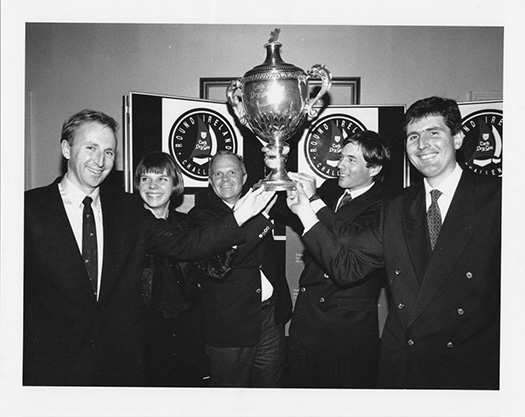
Victory! Lakota's crew with the trophy in 1993 are (left to right) Con Murphy, Cathy MacAleavey, the late Steve Fossett, Steve Scully, and Brian Thompson


























